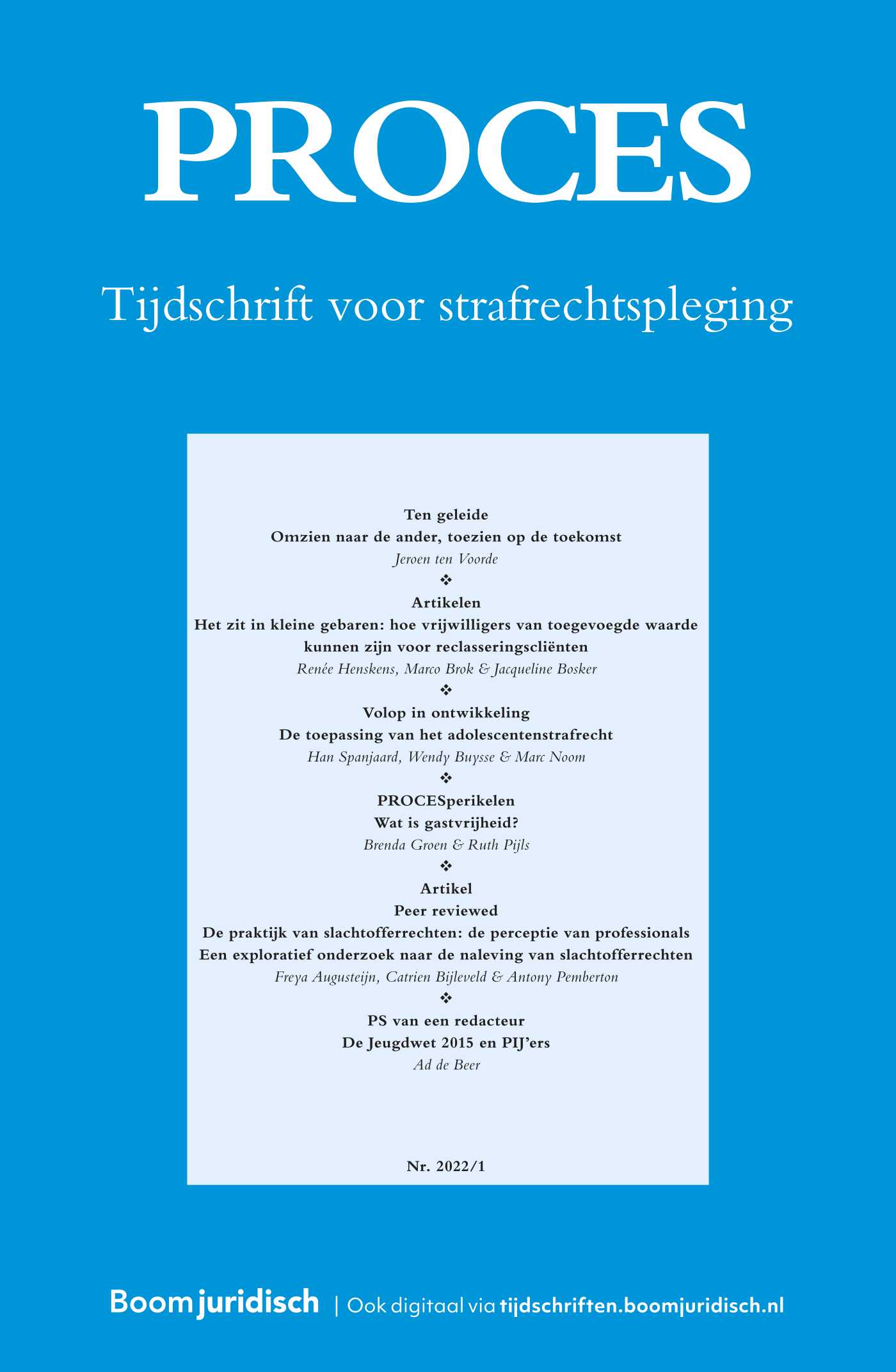|
This contribution summarizes findings from the Prison Project on the longitudinal course of mental health problems during imprisonment. The findings illustrate that prisoners experience high levels of mental health problems. Shortly after their arrival in detention, a quarter of them experienced a high level of mental health problems, which is five times as high as men in the general population. Prisoners’ mental health problems decreased during imprisonment. Both characteristics of the correctional environment (e.g. a fair and respectful treatment by prison staff) and pre-existing characteristics of the prisoners (e.g. personality traits) are related to the course of mental health problems in detention. |


PROCES
Meer op het gebied van Criminologie en veiligheid
Over dit tijdschriftMeld u zich hier aan voor de attendering op dit tijdschrift zodat u direct een mail ontvangt als er een nieuw digitaal nummer is verschenen en u de artikelen online kunt lezen.
| Redactioneel |
Tot elkaar veroordeeld: psychiatrie en detentie |
| Auteurs | Prof. Joke Harte |
| Auteursinformatie |
| Artikel |
Psychische problemen tijdens detentie: een overzicht van kernresultaten uit het Prison Project |
| Trefwoorden | mental health, prisoners, longitudinal, Geestelijke gezondheid, Gedetineerden, Longitudinaal |
| Auteurs | Dr. A.J.E. Dirkzwager en Prof. dr. P. Nieuwbeerta |
| SamenvattingAuteursinformatie |
| Artikel |
Sla het brein niet in de boeien |
| Trefwoorden | Detentie, Zelfregulatie, executieve functies, verarmde omgeving, Imprisonment, self-regulation, executive functions, impoverished environment |
| Auteurs | Jesse Meijers, Prof. Joke M. Harte en Prof. Erik J.A. Scherder |
| SamenvattingAuteursinformatie |
|
Executive functions (EF) are higher order brain functions that are crucial for self-regulation, which may be negatively influenced by an impoverished environment. Since prison can be characterized as an impoverished environment, we studied whether EF and self-regulation decline during imprisonment. While EF are already often impaired in antisocial and criminal populations, we found a decline in attention and self-regulation after three months of imprisonment. We discuss the implications of our findings regarding recidivism and propose to aim for an improvement in executive functions during imprisonment, by enriching the prison environment. |
| Artikel |
ERM-Vroegsignalering opent de deur naar risicomanagementobservaties en dialoog met gedetineerden |
| Trefwoorden | Risicomanagement, Vroegsignalering, Agressiehantering, Incidentpreventie |
| Auteurs | Dr. Frans Fluttert en Gunnar Eidhammer MSc |
| SamenvattingAuteursinformatie |
|
Prison staff is exposed to aggression of prisoners which evokes work stress. In forensic psychiatry risk management principles, such as the Risk-Needs-Responsivity-model (RNR), assist staff to manage aggression by means applying risk management strategies. The Early Recognition Method (ERM) is such an evidence based strategy, developed and tested in forensic psychiatry. In ERM, staff gradually try to attune to aggressive behavior by means of the identification of early warning signs of aggression and systematically evaluated these in predetermined intervals. In this article it is explained and discussed how ERM could be applied meaningfully in prison services. |
| Praktijk |
Over Esam en het nut of de zinloosheid van zorg in detentie |
| Auteurs | Dorina Denzel |
| Auteursinformatie |
| Praktijk |
Suïcide bij gedetineerden in België: een dossierstudie |
| Trefwoorden | Zelfdoding, Suïcidepreventie, Detentie, België, suicide, prevention, prison, Belgium |
| Auteurs | Louis Favril, Ciska Wittouck, Kurt Audenaert e.a. |
| SamenvattingAuteursinformatie |
|
Reducing the number of suicides in prison has been highlighted as an international priority. To date, however, studies examining prison suicides in Belgium are lacking. Therefore, adopting a retrospective record-based approach, we sought to investigate all suicides occurring in the whole Belgian prison estate during a 17-year period. The results underline the need for suicide prevention among prisoners in Belgium, and echo prior findings that restrictive preventive measures should be combined with psychosocial interventions in order to address the causes of prisoners being suicidal. Such strategies are ideally embedded within a comprehensive suicide prevention policy on a national level. |
| Column |
Op bezoek bij gedetineerden |
| Auteurs | Janine Janssen |
| Auteursinformatie |
| Diversen |
PROCES Auteursregister 2017 |
| Diversen |
PROCES Chronologisch register 2017 |
